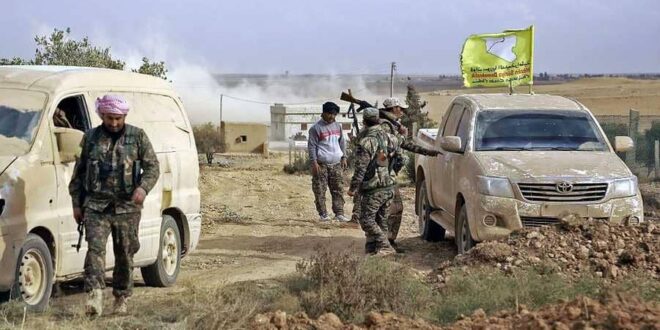The ongoing situation in Deir ez-Zor represents a significant challenge for the SDF, according to al-Souria Net.
Clashes have persisted for three consecutive days in several rural areas of Deir ez-Zor, involving the Deir ez-Zor Military Council, Arab tribesmen, and the Syrian Democratic Forces (SDF). Local sources report that the SDF conducted a raid in the village of Daman in the northern countryside, which resulted in indiscriminate gunfire, tragically claiming the lives of four civilians. Additionally, the SDF declared its control over the town of al-Ezba in the northern countryside and conducted a search operation in the vicinity.
Notably, clashes unfolded in the town of Abu Hamam within the Shaitat region, as well as the town of al-Shuhail in the eastern countryside, where the SDF engaged in combat against tribal fighters for several hours. Sporadic clashes were also documented in Dhiban, where tribal fighters confronted the SDF on Thursday morning.
Sheikh Ibrahim Khalil al-Havel, a prominent figure of the Akidat tribe, issued an audio statement urging unity against the SDF due to what he described as its “systematic policies.” Sheikh Havel proposed the establishment of a military command council, comprising seasoned officers and non-commissioned officers from the region, in direct coordination with the international coalition.
Sources indicate that over 100 members have defected from the SDF in Deir ez-Zor following Sheikh Havel’s appeal. The Euphrates Post disclosedd that tribal leaders are considering forming a “tribal army” in Deir ez-Zor. This prospective entity would oversee local civil, economic, and political affairs, contingent on the SDF’s response – which includes withdrawal of its forces and the release of detainees. The situation remains fluid as tensions continue to escalate.
“A real test for SDF”
The ongoing situation in Deir ez-Zor represents a significant challenge for the SDF, according to Charles Lister, a researcher at the Middle East Institute. In an article recently published by the institute, Lister highlights that the unity of the SDF has faced consistent trials, particularly in the eastern governorate of Deir ez-Zor, where various Sunni Arab tribal factions hold sway on the ground on behalf of an SDF leadership that they have frequently criticized instead of praised.
He says:
Nowhere has that SDF unity been more consistently tested than in Syria’s eastern governorate of Deir ez-Zor, where an array of Sunni Arab tribal factions exert control on the ground on behalf of an SDF leadership that they have more often criticized than praised.
Much of the antagonism that has defined the SDF’s presence in Deir ez-Zor has been rooted in widespread local perceptions that the SDF’s leadership is dominated by Kurds, predisposed not to invest in Arab regions, and has favored corrupt and often brutal Arab figures to be its representatives there, Lister adds.
“Only a major and concerted U.S. effort will stop the current fighting and prevent it from spiralling out of control. U.S. troops in the Conoco and Omar bases have sought to engage tribal leadership, but that may not be enough. Meanwhile, as the situation continues to escalate, only one actor stands well-positioned to benefit: ISIS,” Lister concludes.
 Eurasia Press & News
Eurasia Press & News




